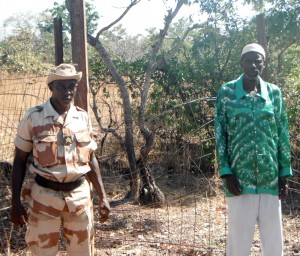The Mali Empire that ruled much of West Africa for 400 years from Niani, this village in Guinea on the Sankarani River, helped establish the first long-term trans-Saharan trade with Europe. One emperor, Abubakari II, is said to have launched pirogues fitted with sails from the coast of Senegal to explore the world beyond. Niani’s elders insist their ancestors landed in North America long before Columbus.
But Sergeant Ishmail Camara, commander of Niani’s small border garrison, isn’t buying my interest in the past. “I teach African history and literature,” I explain, on my knees and glancing up at him, trying to be cheerful while I unpack my backpack as he has ordered. Camara and his men hand my passport back and forth among them. “I came here because I want to see where the empire was born.”
I’ve been pleading the innocence of my mission for half an hour, ever since I walked two miles across the border from Mali to this checkpoint outside Niani. I spread my belongings on a plastic mat in the sand in the late afternoon shade of the tin roofed mud building that acts as a guard post. My mosquito net, a pair of field shorts, a headlamp, water bottle… The red, yellow and green Guinean tricolor hangs limp atop a high wooden pole. Camara, short and wiry like a boxer, stands with his arms folded, the only one of these men in uniform: desert combat boots, pressed and clean desert camouflage and a bush hat, with the brim folded up over his ears. Camara looks like he’s in his 30s, betrayed by lines around his eyes and gray stubble on his chin, but his men are younger, twenties or late teens. They slouch in plastic lawn chairs, wearing a mix of gym shorts, camouflage pants, Chinese made flip flops, and T-shirts that say things like “A Night In Paradise” beside a smiley face with tongue sticking out. They look more like fraternity brothers than border guards.
“You are well prepared,” Camara says, “like a real commando.”
I smile but say nothing.
No one touches my things. Instead, Camara asks me to explain every item and why I am carrying it. I unfold a pocket knife for them. Then I hold up my underwear, a Themarest pad, tins of sardines, a roll of crackers, my medical kit, which I open and go through, setting out every bandage, pill, and tube of antibacterial cream. One of the young men, frowning with concentration, points to a black item in the pile, about the size of a hand grenade. “That!” he shouts, rising from his chair. “That right there,” in a voice that suggests he has found proof of what I am really doing here. “What is that?” I hold it up, pinched between thumb and forefinger, and unwrap a balled up pair of socks. Camera smiles. The soldier looks disappointed.
But this is not a foolish process. To Camara and his men I must look strange, a white man alone, walking out of the forest with a full backpack right into a remote border post as if by accident, 30 miles from the nearest major town. In West Africa, such a distance in bush country is often a full day’s travel (or two) in a barely functioning vehicle. To complicate matters, about 60 miles to the southeast, where Guinea, Mali, and Ivory Coast meet, a civil war has just ended in Ivory Coast, involving mercenaries from Liberia, which also borders Guinea. The network of political lines is tight, complicated by tribal divisions, rumors of white mercenaries, and arms smugglers moving in the borderlands. Calmly, I do as I’m told.
After an hour, Camara hands me my passport and tells me to repack my things. “I sent a message to the village chief,” he says. “You’ll stay with him and his family. You can talk about history with the village elders in the morning.” He watches as I repack. “You’re courageous to come here like this.”
“Maybe.” I look up at him. “Or a little stupid.”
“Well,” he says. “There is that, too.”
